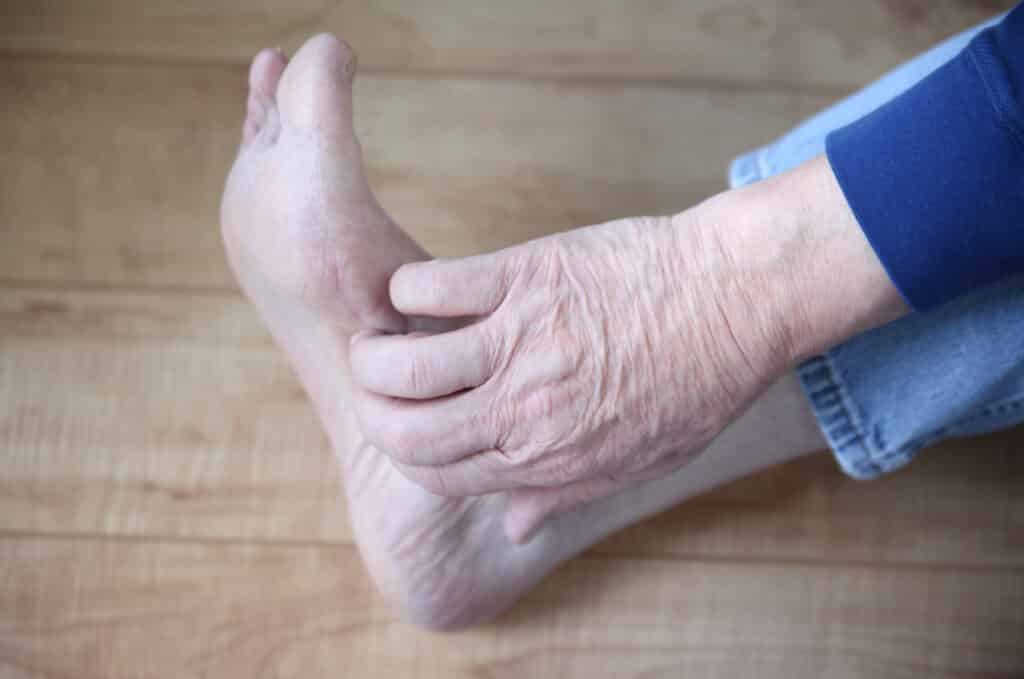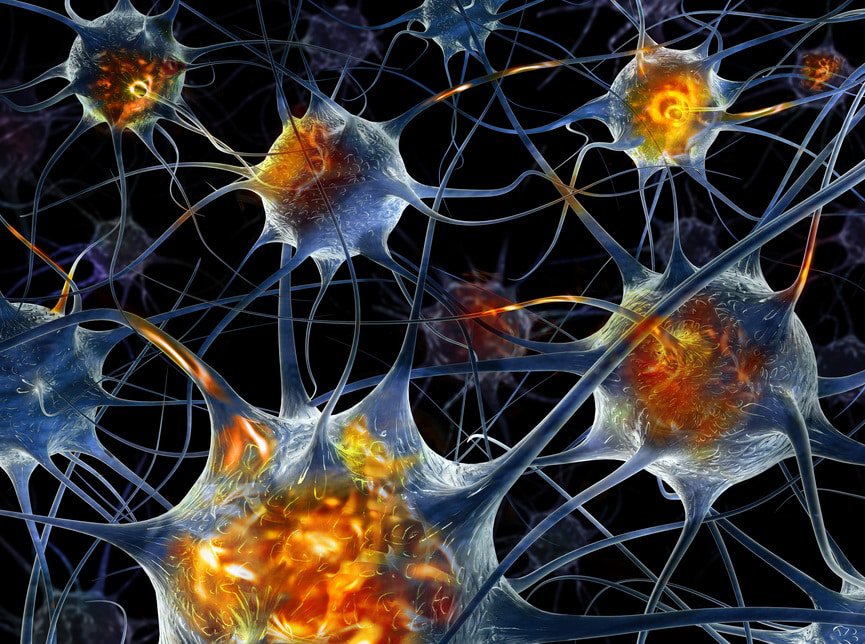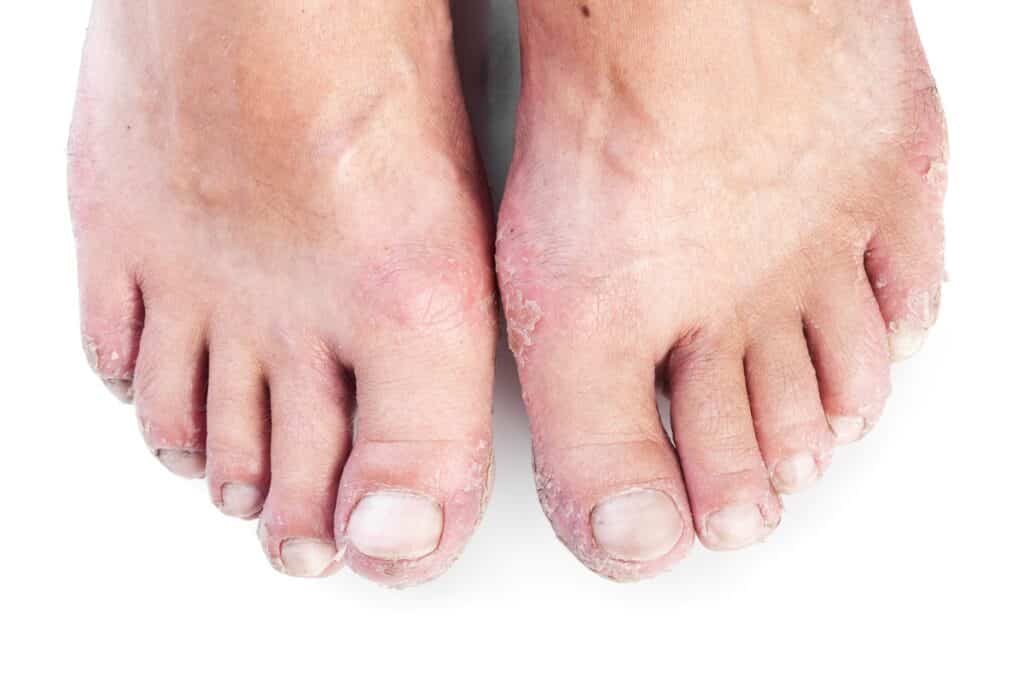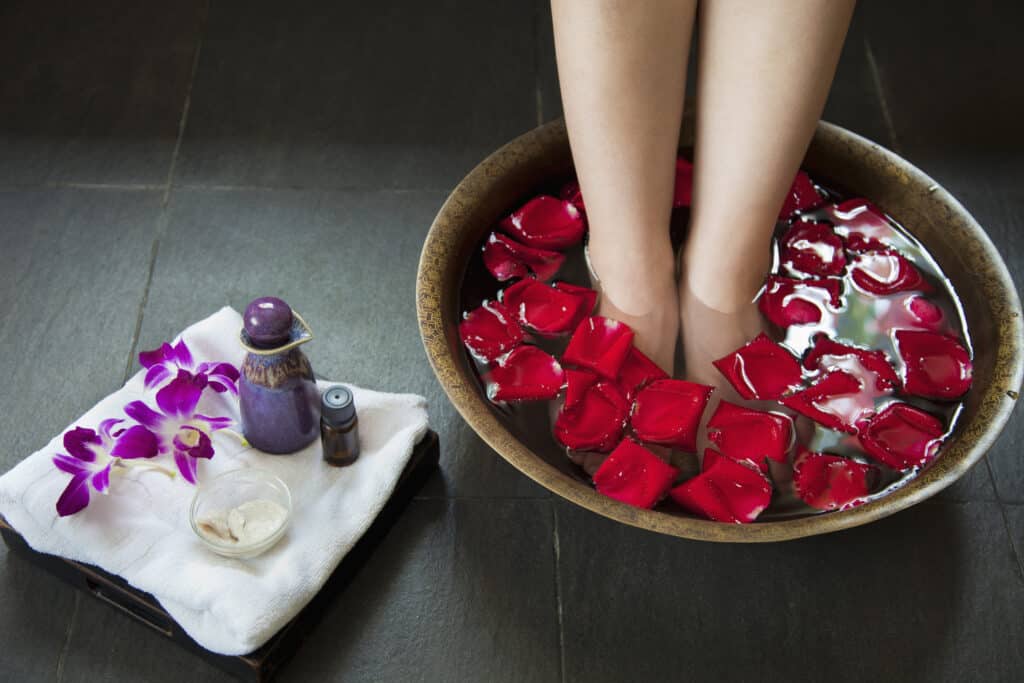Your foot skin is exposed to sweat, irritants, and infectious agents every day.
It’s vulnerable to irritation and infections like athlete’s foot.
All of these factors can cause itchiness, as well as other skin symptoms.
But should you worry about itchy feet?
Read on to learn everything about what causes them, how you can relieve the itch, and how to prevent it.
Signs and Symptoms

Pruritus is the medical term for a skin itch, regardless of the cause.1Jing Song, et al. Pruritus: Progress toward Pathogenesis and Treatment , Biomed Res Int. 2018 Different types of irritation include:
- Cutaneous itch: caused by a skin-related issue like psoriasis, eczema, or urticaria.2Michael Joseph Lavery, Michael Owen Kinney, Hideki Mochizuki, John Craig, and Gil Yosipovitch. Pruritus: an overview. What drives people to scratch an itch?, Ulster Med J. 2016
- Systemic itch: related to internal diseases like liver failure or diabetes. This type of pruritus is generalized, meaning it affects different skin areas.
- Neuropathic itch: caused by an issue with the nerve mechanisms for transmitting skin sensation. For instance, the varicella-zoster virus can remain in nerve cells and reactivate to cause herpes zoster (shingles).3Anne Louise Oaklander. Common Neuropathic Itch Syndromes, Acta Derm Venereol. 2012
- Psychogenic itch: related to psychological factors like dissociation and coping with trauma.4Misery L, Dutray S, Chastaing M, Schollhammer M, Consoli SG, Consoli SM. Psychogenic itch, Transl Psychiatry. 2018
Itchiness can affect your foot skin in different ways.
If your feet itch after a shower, it’s probably due to skin dryness.
Hot water strips your skin of its essential oils, which can cause irritation and pruritus.
Try showering with lukewarm water and use a gentle, hypoallergenic soap.
Make sure you often moisturize to keep your skin supple and hydrated.Itchy feet at night can be the result of uncomfortable footwear and sweat buildup.
Make sure you wash your feet thoroughly and switch to breathable shoes and hosiery.
What Causes Itchy Feet?
The itch signal travels by dedicated nerve fibers.

Histamine (which releases in allergic reactions) and other biological molecules, can make the neurons fire up.
Then, the signal travels through your spinal cord and to your brain.5Amar Dhand, Michael J Aminoffe. The neurology of itch, Brain. 2014 The factors that cause itch neurons to fire a signal are:
Internal Disease
Several medical conditions can cause generalized pruritus.
Depending on your sensitivity, you might notice the itch mostly on your feet. Peripheral neuropathy caused by high blood sugar levels (in untreated diabetes) can present with a neuropathic itch.

If you have diabetes, at risk for diabetes, or your doctor has told you you have high blood glucose, be mindful of any foot-related symptoms. Liver disease can cause itching through several mechanisms, including bile salt buildup under the skin.Other diseases to consider include:
- Kidney disease.
- Hematological disorders like anemia.
- Overactive and underactive thyroid.
- Paraneoplastic syndrome is related to some cancers (especially lymphoma.)
Internal diseases are unlikely to cause foot itch only. Itchy feet are more likely to be caused by a skin condition or an allergy.
Skin Conditions
Dry, irritated, and inflamed skin can all lead to itchiness. Any factor that dries out your foot skin can cause an itch.
These factors include harsh soaps, hot water, as well as walking barefoot.
The latter could also lead to infections like athlete’s foot. Athlete’s foot is a fungal infection you can contract from contact with contaminated surfaces.

The fungi thrive in humid environments like showers and pools, as well as sweaty feet.
To prevent it, use flip-flops or shoes in public areas and choose breathable materials for your socks and footwear. Psoriasis is an autoimmune skin condition that can affect your feet.
Your dermatologist can recommend medication and cosmetics to treat the itch.
To reduce the number and intensity of flare-ups, avoid stressful situations, reduce your alcohol consumption, and stop smoking.6A M G Brunasso, M Puntoni, W Aberer, C Delfino, L Fancelli, C Massone. Clinical and Epidemiological Comparison of Patients Affected by Palmoplantar Plaque Psoriasis and Palmoplantar Pustulosis: A Case Series Study,, British Journal of Dermatology. 2013
Allergic Reactions
Different chemicals, including some medications, can cause itchiness.
- Drugs like statins (cholesterol-lowering) and ACE-inhibitors (for high blood pressure), as well as illegal narcotics (opioids), can trigger pruritus. Your skin might also become irritated if you recently started using a new product (e.g., a laundry detergent.)
Burns
When you recover from a burn, the skin around the injury can become itchy.
While this usually subsides as the area heals, be extra gentle with your skincare and make sure you moisturize.
Home Remedies for Itchy Feet
Treat the pruritus by addressing the cause. If you recently tried out a new product (either cosmetics or laundry detergent,) switch back to the original.
This will help you confirm or rule out an allergic reaction and stop the itchiness.
The same goes for any new medication you might have started.
Contact your doctor to check if itchiness is a potential side effect.
To treat dry and itchy skin after a burn, use a gentle moisturizer twice a day.
Apply cold compresses for temporary relief or soak your feet in lukewarm water.
Athlete’s foot has several science-backed home remedies:

- Tea tree oil applied daily kills the fungus and relieves symptoms in a few weeks.7F. C. Flores, J. A. de Lima, R. F. Ribeiro, S. H. Alves, C. M. B. Rolim, R. C. R. Beck. Antifungal Activity of Nanocapsule Suspensions Containing Tea Tree Oil on the Growth of Trichophyton, Mycopathologia. 2013
- Foot soaks with vinegar and sea salt can treat the underlying cause and reduce itchiness.8Michelle Pirrie Stockwell, John Clulow, and Michael Joseph Mahony. Sodium Chloride Inhibits the Growth and Infective Capacity of the Amphibian Chytrid Fungus and Increases Host Survival Rates, PLoS One. 2012
- Cloves of garlic rubbed on the affected area can stop the fungal infection and resolve the symptoms.9E Ledezma, L DeSousa, A Jorquera, J Sanchez, A Lander, E Rodriguez, M K Jain, R Apitz-Castro. Efficacy of Ajoene, an Organosulphur Derived From Garlic, in the Short-Term Therapy of Tinea Pedis, JMycoses. 1996
When To See A Doctor
In some cases, pruritus could be the sign of a more serious medical condition. Make sure you consult a specialist if:
- Your itchy feet don’t improve with home remedies.
- The symptoms get worse.
- You notice pain and swelling that doesn’t improve with time.
- You develop a fever, fatigue, or other flu-like symptoms.
- You have been diagnosed with diabetes, liver disease, or kidney problems.
- Your doctor has started you on a new medication (or you’ve started taking an OTC drug or food supplements.)
How to Prevent Itchiness?
Taking good care of your feet is the best way to prevent itchy, irritated skin. To maintain foot hygiene:
- Wash your feet thoroughly with mild soap. Make sure you reach between your toes, too.
- Exfoliate with a scrub or callus remover, then moisturize with a rich, non-irritating cream.
- Wear socks made out of natural fibers (wool, cotton, bamboo.)
- Dry your feet thoroughly before putting on socks and shoes.
- Choose well-fitted and breathable shoes.
- Avoid walking barefoot in public areas, especially humid spaces like locker rooms and showers.
- Maintain a healthy lifestyle to prevent systemic diseases like diabetes and improve chronic skin conditions like psoriasis.

Got rid of Hsv,,,,,,,,,
It worked for me, Thank you!!!